Orange County Oil Spill Prompts Extensive Clean Up Along Southern California Coastline

The ground and seas rattled and shook as the heart-pumping aerobatic demonstrations of the high-flying aerial planes roared over Huntington Beach last Saturday during Orange County’s largest and most popular event of the year. Last weekend, millions of spectators looked up into the blue skies from boats and land and were wow’d, oooh’d and awe’d over the breathtaking maneuvers in tightly packed formations of multiple planes in the sky during the Pacific Airshow. No one anticipated what would come next. Broken hearts, teary eyes, and the words oil spill clean up being added to the afternoon’s list of events were never on anyone’s radar. Oil spills in the ocean are never a part of Huntington Beach’s Pacific Airshow!
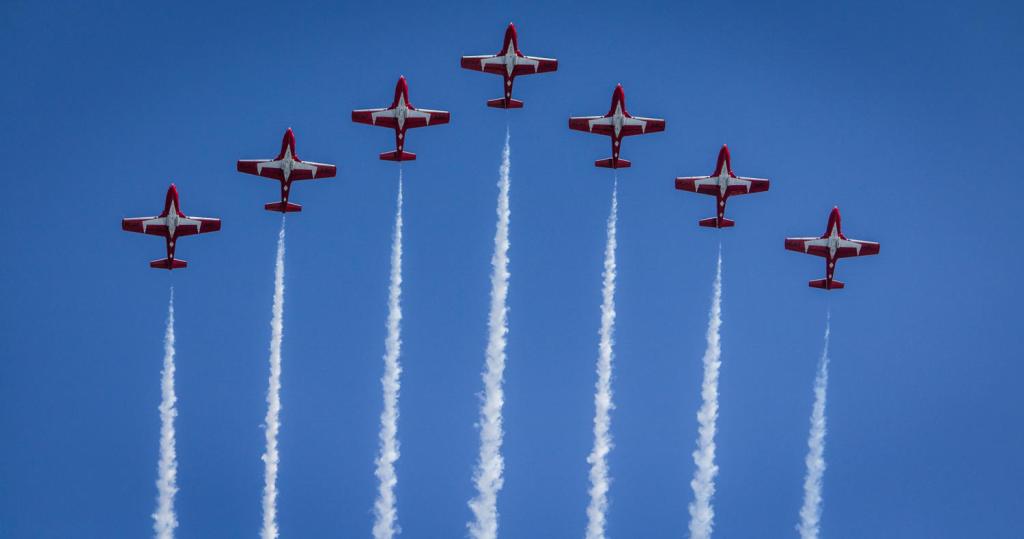
Well before the oil ever reached the shore, the pungent smell of petroleum wafted through the air of the ocean breeze reaching beachgoers across over 8.5 miles of Huntington’s sandy beach. Saturday, October 2, 2021 is now a day that will sadly, forever be remembered as the tragedy crude oil left behind. Crude oil originating from an offshore pipeline owned by Houston, Texas-based Amplify Energy Corporation currently operated by Beta Offshore, is the largest Southern California oil producer. Their rig is located just 12 miles south of Long Beach, CA. The extensive and massive oil leak originated from a 13” lateral laceration within a 17 mile underwater Beta Offshore oil pipeline. The damage now totals an estimated maximum of 144 gallons of crude oil that was leaked into the water. The leak may have stopped, but the spill has created an oil slick over 13 miles long and is now expected to devastate southern beaches as far as San Diego, CA in the coming weeks and months.
The contamination is considered a statewide environmental catastrophe and a total detriment to our pristine Southern California ocean. Oil spill clean up teams and hazardous waste responders were notified about the leak Saturday afternoon, canceling the last day of the high flying acrobatics of the highly anticipated annual Huntington Beach Pacific Airshow and on-shore musical festival, “After Burner”, back for the first time in over 10 years. Canceling the event was incredibly unfortunate but the only safe choice as first responders and prevention teams began to slow the southward flow of the oil.
To date, the oil spill clean up in Huntington Beach marks the largest crude oil spill to have ever taken place in Southern California. The tragedy of the effects of oil spills on marine life here and the devastation to nearby wetlands will impact sea life for generations to come. On Sunday morning October 3rd, 2021 just hours after the spill became public, Capt. Dave’s Dolphin And Whale Watching Safari were honored to be chosen as the private charter accompanying FOX News and Good Day LA into the oiled-infested water. Our very own Captain Gary Brighouse teamed up with our staff marine biologist, wildlife photographer and first mate Caitlyn Neiblas, who showed news anchors a first-hand look at the immediate aftermath of the effects of the spill. TV cameras were able to get a safe and up-close personal first look at the oil on the water as well as the initial oil spill clean up and felt the heartbreak of the immediate catastrophe of oil on water.
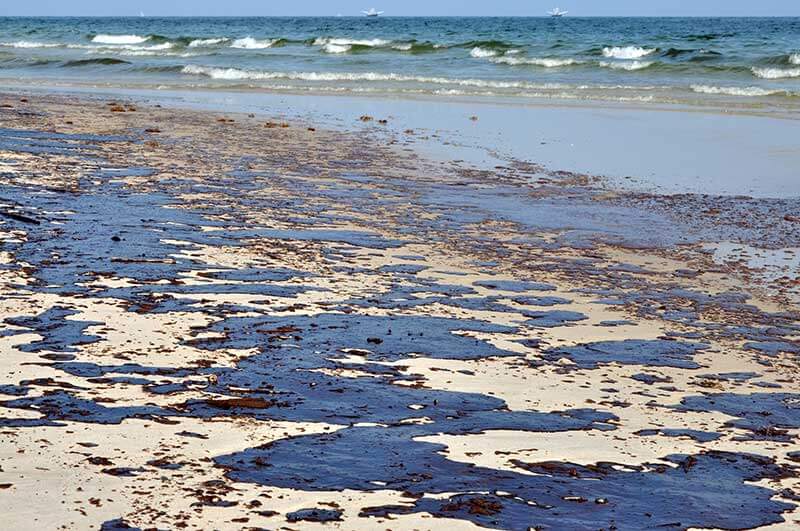
So….What Now?
Unfortunately, at this time, the most honest answer is, “we just do not know.” Dana Harbor was temporarily closed out of an abundance of caution and has been reopened now that it is safe for boats with passengers to leave the harbor. We will navigate through these extremely uncharted waters taking everything day by day and will share updates on our social platforms so you have the most up-to-date insight and information on when trips will be heading back out on the water. One thing we know for certain: We are here to help in any way we can. We are doing our part to safely protect the wildlife we all love so dearly. This oil spill clean up affects all of us and we, along with our staff, are putting our hands up to volunteer at nearby beaches, rescue efforts, and more to do whatever it takes to help speed up the process of this oil spill clean up!
Even though our beloved Dana Point Harbor was temporarily closed (the harbor reopened to boating on October 8, 2021) and our amazing whale watch safari tours on our fleet of catamarans, Zodiac-style boats, and private charter boats were on hold for a shore time until it was safe for passengers to take an eco ocean tour on the water again, we want to encourage you to take a moment and spend a little extra time online getting to know us. We invite you to learn more about Capt. Dave and the incredible work he has done with whale rescue. Scroll through and learn more about our amazing Dolphin Safari team, as well as how many different types of dolphins and whales we have in this part of the world. You will immediately see how wonderful this region ‘whaley‘ is!

Continue reading for more insight on the Huntington Beach oil spill and the detriment oil spills in the ocean cause to marine communities both in and out of the water.
What is crude oil?
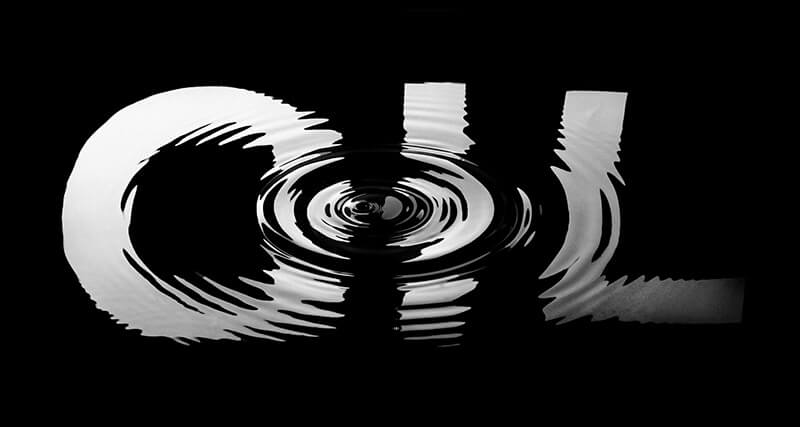
In the most rudimentary form, crude oil is composed of plants and small invertebrates called plankton. Plankton uses sunlight from the water’s surface when brought up from the ocean floor during instances of upwelling to create “algae blooms”. Over millions of years, plankton that swims in the water column eventually dies and then falls to the ocean subfloor. Once in the subfloor, these microorganisms combine to create sludge-like material, which can then be pulled up by an oil rig, in the form of unrefined crude oil.
There are two different types of crude oil: sweet crude and sour crude oil. Sour crude contains a form of hydrogen sulfide. This is the main type of crude that we have in California. Sour crude oil can be deadly. Once in contact with it, it interferes with the part of the brain that regulates breathing causing suffocation, and significantly lowered blood pressure – a toxic pair.
Does Crude Oil Smell?
Chemical composition has everything to do with the smell of crude oil. The more pungent the smell, the more sour the oil. In California, the crude is higher in hydrogen sulfides, therefore making it a breathing hazard, giving it a worse smell.
What is a Tarball And is it Dangerous?
Once crude oil reaches beaches, the sun burns off volatile material inside oil slicks, turning the oil into a “tarball.” Tarballs are then collected by Hazwoper teams during oil spill clean up days along the beaches and wetlands. Crude oil tarballs are considered hazardous and toxic materials. As such, when it comes into contact with your skin it becomes dangerous and has the potential to cause skin irritation and in some cases skin cancer if given prolonged exposure.
Why Are Oil Spill Clean Up Teams Important For Marine Life?
Being home to more than nine species of various whales commonly seen right here in Dana Point is just one of the many reasons the oil spill clean up from the circumstances off Huntington Beach must happen both quickly and efficiently. Different types of dolphins from both the Odontecetes family of toothed whales and the larger rorqual whales of the Mysticete family spend their time in Dana Point, California year-round. Over 450,000 resident common dolphins (who are the most abundant of the toothed whale species) call our water their home every day, week, month, and year over year. Oil spills in the ocean contaminate our clean water, ruining marine habitats for an abundance of marine animals species. It is appalling to hear from various news sources that investigators found that the owner of the Beta Offshore pipeline didn’t do enough to stop the leak despite receiving an early warning signal.
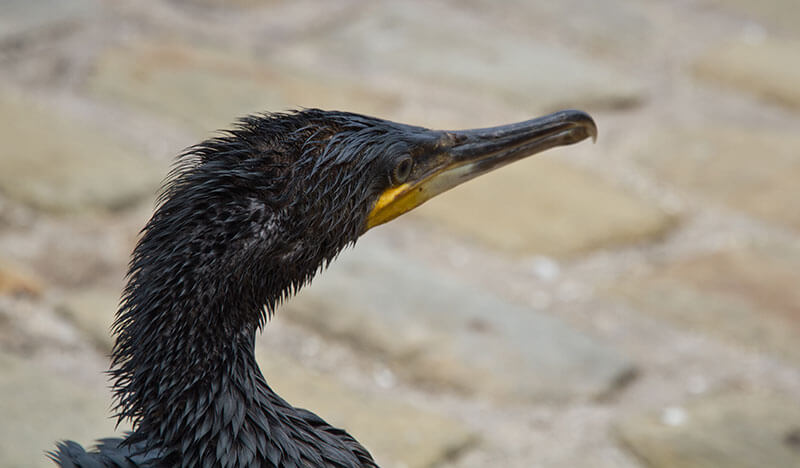
The effects of oil spills are damaging past the initial clean up relief. We cannot afford to delay oil spill clean up efforts and must do everything possible to immediately restore our ocean for these magnificent creatures. That is why Capt. Dave’s Dolphin and Whale Watching Safari is listening to the guidance of the Dept. of Fish and Wildlife and other organizations who are mobilizing and gathering volunteers to help the oil spill clean up efforts. We have been working hand in hand with wildlife oil spill response teams up and down the coast with non-profit organizations such as the Pacific Marine Mammal Center and the Huntington Beach Wetlands & Wildlife Care Center to collect nonperishable goods, in addition to response and recovery materials like N95 masks needed for response teams for this massive ocean clean up.
Many Sea Animals Breathe Air From The Water’s Surface
Just like you and I, whales, dolphins, sea lions, seals, turtles, sea birds, and more all require oxygen from the earth’s surface to survive. Much like deflated mylar balloons in the water resembling jellyfish to Mola Mola’s (ocean sunfish) or longline fishing nets creating deathly entanglements for ocean wildlife, oil spills create an inescapable obstacle for ocean animals. Oil spill clean up is pertinent to a whale or a dolphin’s survival. This reminds us about some extremely important whale facts directly related to why oil spills in the ocean are life and subsequently deathly matter for these amazing animals. The most important thing to note is that whales and dolphins breathe air. When the toxic sludge of crude oil at the water’s surface is breathed into the lungs of mammals, the fumes from oil have the capability of inoculating a whale, causing the whale to drown.
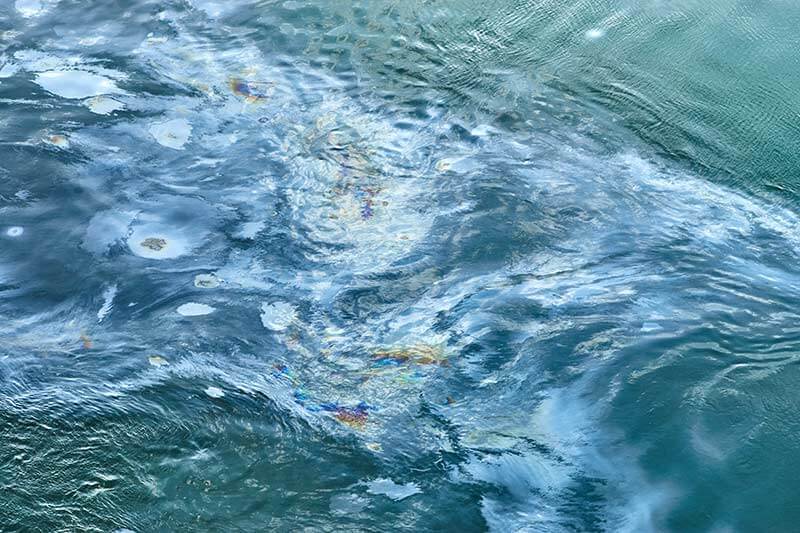
Blubber Can be Defouled by Crude Oil
Did you know the main insulation source for large sea mammals is called blubber? Although blubber is uniquely designed not to be able to be penetrated by oil, cetaceans can still digest fish and other natural food resources which are soiled in crude oil. High doses of ingested toxic chemicals from crude oil have adverse reactions on neurological systems.
Do Seabirds Already Have a Thin Layer of Oil on Their Feathers?
In short, yes. Regardless of oil spill clean up, when a bird preens themselves, they apply a thin waxy oil-esque substance to their feathers which allow seabirds to repel water. Sea birds, having more feathers than birds on land, must preen their feathers before taking diving plunges into the water or setting off to hunt for small schooling fish in open water. This behavior is especially important for birds such as the Arctic Tern with their record-breaking migration of any other animal in the entire animal kingdom, traveling nearly 56k miles from Pole to Pole each year.
When the effects of oil spills destroy the insulating capability and water repellency of a bird’s feathers, it leaves seabirds waterlogged and extremely vulnerable to harsher conditions. The result is death. Oil spill clean up organizations concentrate heavily on seabirds because they are easier to capture. When oiled birds become saturated with oil, they are not able to fly. When a bird is covered in oil, its life tragically becomes certain death from toxic oils, malnourishment, hypothermia, and lurking bird preying predators. Devastatingly, oil spill clean up data experts have shown that year over year, some 500,000+ seabirds die each year due to being covered in this tar-like death sentence material from oil spills in the ocean.
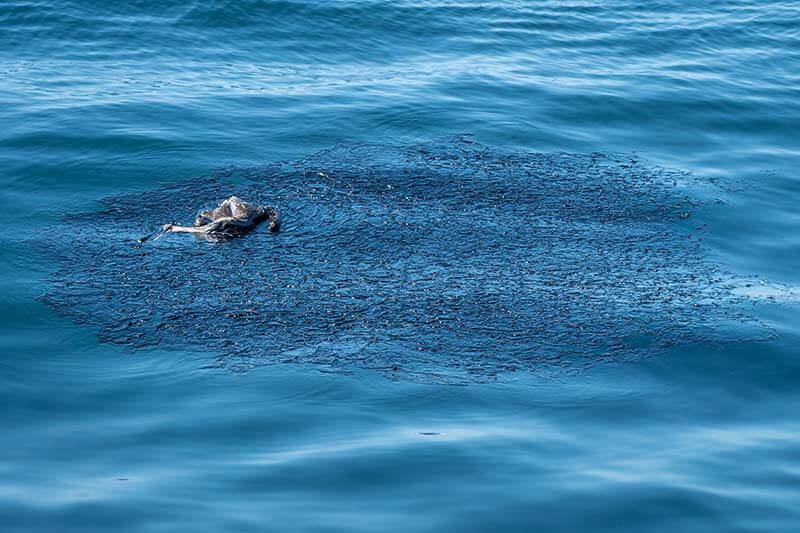
Are Oil Spills Common?
Oil spill clean up tragically happens every year. In 2020 three oil spills from oil tankers were recorded worldwide. Five took place in 2019. According to NOAA fisheries, in 2018 a record-breaking 137 oil spills were recorded, an average of approximately 11 each month! Off-shore drilling for oil is a massive environmental problem with tremendous consequences and no safe way to derive oil without endangering wildlife. Oftentimes, oil spills in the ocean do not even make headlines and you never even hear about them on the news. Unless they are considered “big” they are hardly ever televised.
“The International Tanker Owners Pollution Federation (ITOPF) defines a large oil spill as more than 700 tonnes (219,000 gallons) of oil and a medium-sized spill as being between 7 and 700 tonnes (2,200 gallons to 219,000 gallons).” – www.blog.resourcewatch.org.
One of the most heard around the world oil disasters and the largest oil spills in the ocean was that of the BP oil spill heard around the globe in 2010. The explosion of the drilling rig Deepwater Horizon, operating in the Macondo Prospect in the Gulf of Mexico leaked, ignited, and sank on August 20, 2010, spilling over 205 MILLION GALLONS of crude oil into the Gulf of Mexico. After the explosion, oil continued to leak for months. This oil spill clean up earmarked the worst oil spill ever recorded in history, killing 11 people and thousands of marine species, and still holds the title to date. The effects of oil spills such as this one are devastating.
Ecosystems and marine habitats were destroyed. Twenty-nine different species of marine animals such as bottlenose dolphins, spinner dolphins, melon-headed whales, and sperm whales were exposed to crude oil from this spill causing a total of over 1,400 marine mammals to be covered in the tar-like slick. An unnumbered amount of fish, including bluefin tuna and the habitat for our nation’s smallest seahorse, were all affected. Several hundreds of bottlenose dolphins died and over 46% of their population in this region experienced failed pregnancies. The Center for Biological Diversity has estimated that a shocking 82,000 birds of 102 species, approximately 6,165 sea turtles, a multitude of dolphins and whales were exposed.
Although oil spill clean up efforts continued, one of the most tragic of the related deaths due to this oil spill was that of the Bryde’s whale (pronounced broo-tus) or Balaenoptera brydei population. Over half of their entire population felt the oil on their sleek and elusive bodies, resulting in losing nearly 17% of their population as a whole. Now, with just over forty Bryde’s whales left in the world, the Deepwater Horizon oil spill is recorded as the biggest threat to this species.
Oil spill clean up teams could not save the already endangered sperm whales, Physeter macrocephalus, residing in the area too. Of the 1,600 population, nearly 100 of them were killed. The potential of this oil spill wiping out the entire population was globally HUGE. Since female sperm whales do not reach sexual maturity until close to nine years of age or when they reach 29 feet in length, and only deliver one baby at a time, populations are already at risk for regrowth. It is estimated that an additional 50+ animals lost their lives to this tragic oil spill and either drowned and sank or were consumed by lurking predators and could not be counted by researchers. Now, eleven years after the Gulf of Mexico oil spill clean up, the effects of this tremendous earthly disaster are still upon the precious marine life that inhabits the Gulf. Prime dolphin and whale habits continue to be contaminated. Sadly to say, the Deepwater Horizon spill was not the only oil spill to break records.
Bligh Reef, a well-known navigation hazard in Alaska’s Prince William Sound was the reason behind the Exxon Valdex oil spill of 1989. At the time, this tragedy was known as the largest oil spill in US history and was another result of carelessness when Captain Joseph Hazelwood allowed an inexperienced 3rd mate to take over the helm of the large ship, running it aground into Bligh Reef. In the months to come, it took over 11,000 of Alaska’s finest residents to work on the oil spill clean up. The economic loss of roughly 2.8 billion dollars was nearly as tragic as the loss of life in these once-pristine regions. Due to catastrophic oil spills in the ocean like this one, fishermen lost jobs, public charters were forced to close their doors and small towns became completely bankrupt. It is estimated that roughly 250,000 sea birds, 3,000 otters, 300 seals, 250 bald eagles, and 22 killer whales all lost their lives from this disaster. Some researchers and scientists also believe the overall collapse of salmon and herring fisheries in the area was also attributed to the spill, despite oil spill clean up efforts.
The effects of oil spills both large and small, all have the same deadly outcome. Damaged reef systems, destroyed marine habitats and loss of marine life are all heartbreaking results of oil spills in the ocean. The only real thing that will ever truly prevent these spills from happening is the removal of off-shore drilling completely. For many, trying to understand what you can do to support cleaner oceans is daunting. While the world is working towards a direction to reuse and repurpose, there are avenues you can support in lieu of off-shore drilling. Try researching legislation for ocean planning, support investment into renewables and energy efficiency measures, and clean technologies research. Educating yourself about how you can make change is the best step in the right direction!
Stayed tuned in to Capt. Dave’s Dolphin and Whale Watching Safari for more updates on the Huntington Beach oil spill clean up and more fascinating insight about whales, dolphins, and our vast and precious marine life in Dana Point, California, Whale Watching Capital Of The World®.
Until next time,
The Team at Capt. Dave’s
